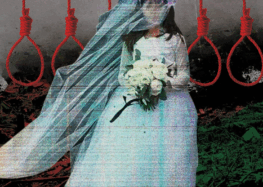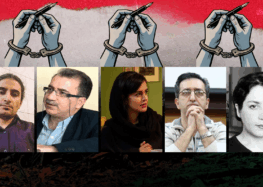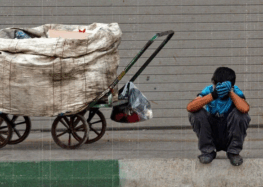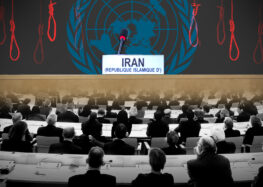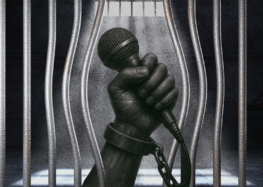“Mr. Larijani, You Are Lying!”: The Fourteenth Human Rights Council Session in Geneva
The Fourteenth Session of the United Nations Human Rights Council continues in Geneva (31 May-18 June 2010). Last Thursday, the head of the Iranian delegation, Javad Larijani, attended a meeting to review reports from Iran. Larijani had to observe explicit criticism of the human rights situation in Iran from member countries and international NGOs. Several non-governmental organizations present at this meeting countered Larijani’s statements about freedom of expression and human rights conditions in Iran, naming several Iranian prisoners of conscience who are currently in prison because they expressed their opinions. Among the names mentioned were Emadeddin Baghi, Shiva Nazar Ahari, Milad Asadi, and Hengameh Shahidi.
Ebrahim Mehtari, a young man imprisoned after the June presidential election, was a witness at the meeting. He testified about his unimaginable physical abuse and torture, reporting cigarette burns on his skin and sexual abuse. Several journalists who looked at this young man’s scars were outraged at the Iranian delegates’ claims.
Larijani was not spared criticism. In the middle of his speech on Thursday, someone shouted, “Mr. Larijiani, you are lying!” The vocal critic was escorted outside. In his response, Larijani repeatedly criticized the situation of human rights in the US, to the point where he was reminded by the moderator that this meeting was to review the situation of human rights in Iran and not other countries such as the US. He issued another warning to Larijani for evading responding to specific cases and not providing clear answers.
During the Iran report review, 12 countries stated their opinions including the United States, United Kingdom, and Norway. Nations explicitly criticized instances of human rights violations in Iran and the government’s lack of cooperation in admitting a special rapporteur. Countries such as China, Kuwait, Pakistan, Venezuela, and Cuba, who are Iran’s strategic allies, defended and praised the situation of human rights in Iran.
A western diplomat told the International Campaign for Human Rights in Iran that the Islamic Republic of Iran had lobbied friendly countries to sign up for the 12 spots on the government speakers’ list, causing a struggle for positions on the list. Ten non-governmental organizations had also signed up (eight critical and three supportive of Iran). The three Iranian NGOs praised Iran’s human rights situation and its achievements in this area. Worth noting was that after the meeting ended, a member of the Iranian delegation shook hands with the NGO representatives who were traveling with the government delegation, thanking them.
Also worth noting was the presence of a Ministry of Intelligence official traveling with the Iranian delegation. A member of the Iranian delegation told the Campaign, “Imagine, when a Ministry of Intelligence figure is sent along with the government and NGO delegations, how is it possible for any NGO to take positions against those of the Iranian government? Another individual close to the Iranian delegation told the Campaign, “The text read by NGOs at the meeting had been reviewed by Iranian authorities.”
According to one session attendee, the intelligence officer with the Iranian delegation is responsible for NGOs in Iran and has had an effective role in the implementation of constraints on NGOs and civil society organizations inside Iran. “It is unacceptable for delegation members from different countries, if intelligence or security forces who have been engaged in violence or who have acted in support of violence, particularly those who have served as interrogators and who have a record of direct violence, participate as members of delegations. Necessary research will be conducted to identify these individuals and to prevent them from attending future sessions,” an attendee told the Campaign. The Campaign is aware of two names under scrutiny in this regard and is withholding their names pending the establishment of facts.
The three pro-government NGOs accompanying the Iranian delegation left the meeting immediately after reading their statements. Several members of these organizations avoided facing human rights activists based outside Iran. “Because of the delegation’s high-security atmosphere, if we are seen with critics of the human rights situation in Iran, we could face serious consequence upon our return,” a member of one of the NGOs told the Campaign.
Fatemeh Alia, a conservative Member of the Iranian Parliament, was sitting next to Javad Larijani throughout the session. At one point, as she was leaving the meeting, a former political prisoner approached her and asked her, “How could you say there is no torture in Iran?” Describing a part of what had happened to him in prison, he told Alia, “It is not honorable to hide the situation of human rights in Iran and to conceal the murder and torture of people.” Alia replied that whenever a case has been reported to the Parliament, she and her colleagues have set out to investigate. At this time, a member of an Iranian NGO walked up to Alia and said, “The last speaker, Mr. Larijani’s responses were very good.” Alia replied that the last speaker had not been Larijani. It appeared that the other individual had not heard Larijani’s speech at all. Later, Alia told the Campaign that there was a heavy air surrounding those who had come from Iran, and that many attendees did not agree with the delegation’s viewpoints.
The participation of some NGOs in the session was planned to disrupt the work of other NGOs and human rights activists. Some of the groups actively tried to be present in the adjacent meeting rooms to cause disruptions in the speeches. The speech of a women’s movement activist who was presenting a report on the situation of women in Iran was disrupted by a member of the Iranian delegation who started swearing. Several attendees objected to the conduct of the Iranian non-governmental delegate, saying that such conduct was disruptive to the meeting’s order and demanded an end to the disruptions.
Some non-governmental delegates persistently removed announcements of the meetings of Iranian NGOs and human rights organizations, attempting to keep diplomats and conference attendees from attending such sessions.
At the meeting to review the report on Iran, Larijani once again refuted the points raised about violations of human rights in Iran. He defended the Iranian Judiciary’s performance and denied the occurrence of any violence, torture, or imprisonment even as several victims were present at the meeting.
The Iranian government’s official delegation had the full support of the NGOs accompanying it. The close relationship of the NGOs to the Iranian delegation was disconcerting for many conference participants. Following the same pattern as the government delegation, the Iranian NGOs criticized the situation of human rights in other countries and praised the improved conditions of human rights in Iran.
At the February 2010 UN Human Rights Council meeting, other countries had made dozens of recommendations to the Iranian government and the Iranian delegation replied to 123 of them. At the time, responses to the remaining recommendations was postponed until the next meeting. The Iranian government addressed a list of 20 areas such as torture, executions, freedom of speech, and freedom of assembly. The Islamic Republic rejected 65 recommendations from different countries.

